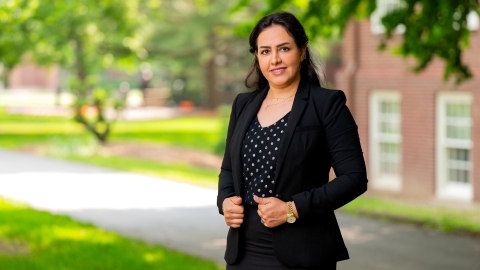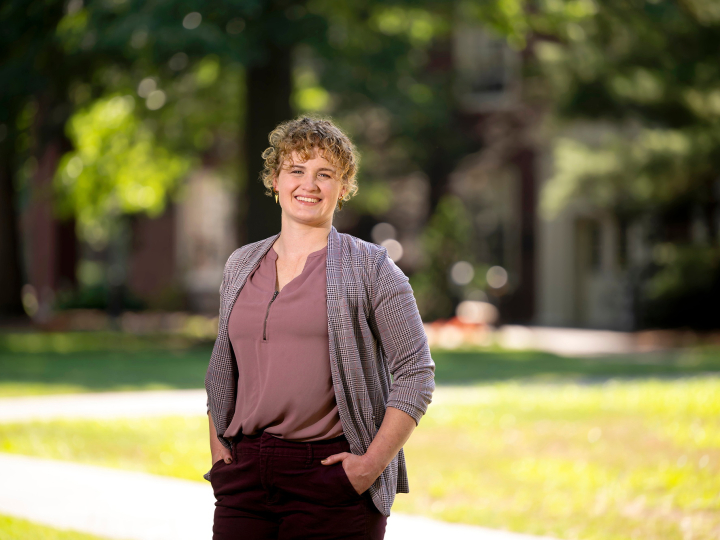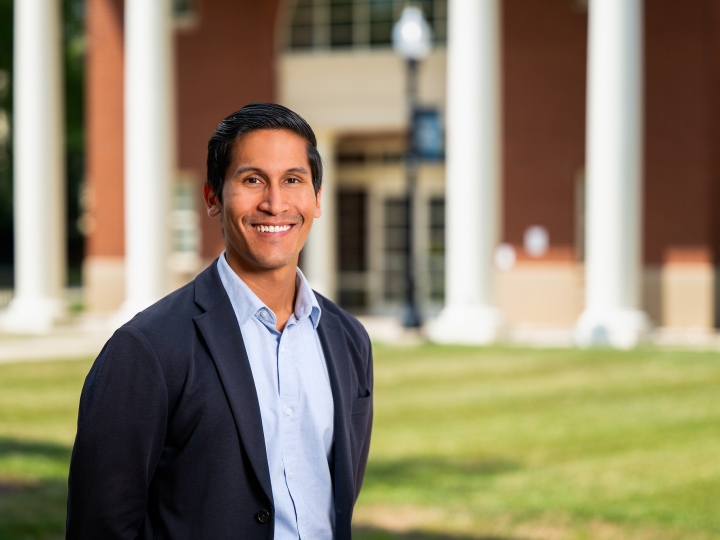
Vaji Farhadi, Electrical & Computer Engineering
August 4, 2025
Professor Vaji Farhadi, electrical & computer engineering, works with Bucknell students to develop smarter, more resilient power grid systems using artificial intelligence. Photo by James T. Giffen, Marketing & Communications
"I really care about teaching, and at Bucknell, teaching is taken seriously. The interaction between faculty and students here is so much more than what you see at a research university."
Vaji Farhadi's academic path took her through large, research-driven universities — first at Amirkabir University of Technology in Tehran, where she earned her bachelor's in biomedical engineering (with a minor in bioelectric) and master's in electrical engineering, and later at Penn State, where she completed her Ph.D. in computer science and engineering. At each step, she deepened her technical expertise while navigating multidisciplinary research environments.
But when it came time to choose where she wanted to build her career as a professor and researcher, she knew she wanted something different.
"I really care about teaching, and at Bucknell, teaching is taken seriously," Farhadi says. "The interaction between faculty and students here is so much more than what you see at a research university."
Today, as an assistant professor of electrical & computer engineering at Bucknell, Farhadi is pursuing cutting-edge research in smart grid resilience by integrating artificial intelligence with engineering solutions, all while working side by side with students.
Her research focuses on the control networks of smart grids — the systems that monitor, coordinate and manage the flow and recovery of electricity across the grid, especially during disruptions.
"A smart grid is essentially a power network with a control network layered on top," she says. "My work is about making that control network more resilient, so if there's a failure, the system knows how to respond quickly, without cascading into a full shutdown."
To do that, she uses reinforcement learning — a type of machine learning where systems learn by interacting with their environment, improving through a cycle of rewards and penalties, as well as federated learning, a method that allows multiple systems to collaboratively learn without sharing raw data.
"Reinforcement learning is like how we teach kids with positive and negative reinforcement," she says. "You give the machine an environment — the power grid — and say, 'You're free to make any decisions.' Then it learns through feedback which actions are good and which ones aren't."
Federated learning adds another layer, allowing different parts of the grid to train models locally and share what they've learned without exposing sensitive information.
Farhadi collaborates with Bucknell students to explore these cutting-edge questions. "Last summer, I worked with two students — one was a computer science major and the other was an electrical & computer engineering major — on how to design a better control network," she says. "They each brought different strengths. One focused on coding, the other on data prep. Together, they complemented each other."
Another student has been working with Farhadi for over three semesters on optimizing backup power systems. "He didn't know much at the beginning, but with time, dedication and patience, he has grown into the research," she says. "That's what it's about — progress, making mistakes and learning from them."
Farhadi's path to Bucknell was shaped not just by her passion for research but also by her commitment to teaching and mentorship.
"At Bucknell, the interaction between faculty and students is so strong," she says. "Teaching is taken seriously, and I really love that."
She also brings a personal mission to her work: to help students build confidence in their ability to solve real-world problems. "The most important thing they can learn isn't just the content. It's to be observant, to ask if something can be made better, and to believe they can make even a small contribution."
That belief comes from her own experience growing up in Iran, where young women were often discouraged from pursuing math and engineering.
"When I told my parents I wanted to study math, they said there was no future for girls in it," she says. "My school even required me to get a permission slip signed to take math classes."
It's that same determination she now encourages in her students. On the first day of class, she gives them a piece of paper and asks: Why did you take this course? What do you want to learn? How will you use what you learn?
Because for Farhadi, engineering isn't just about solving technical problems — it's about empowering students to believe in themselves and think critically about the world around them.

